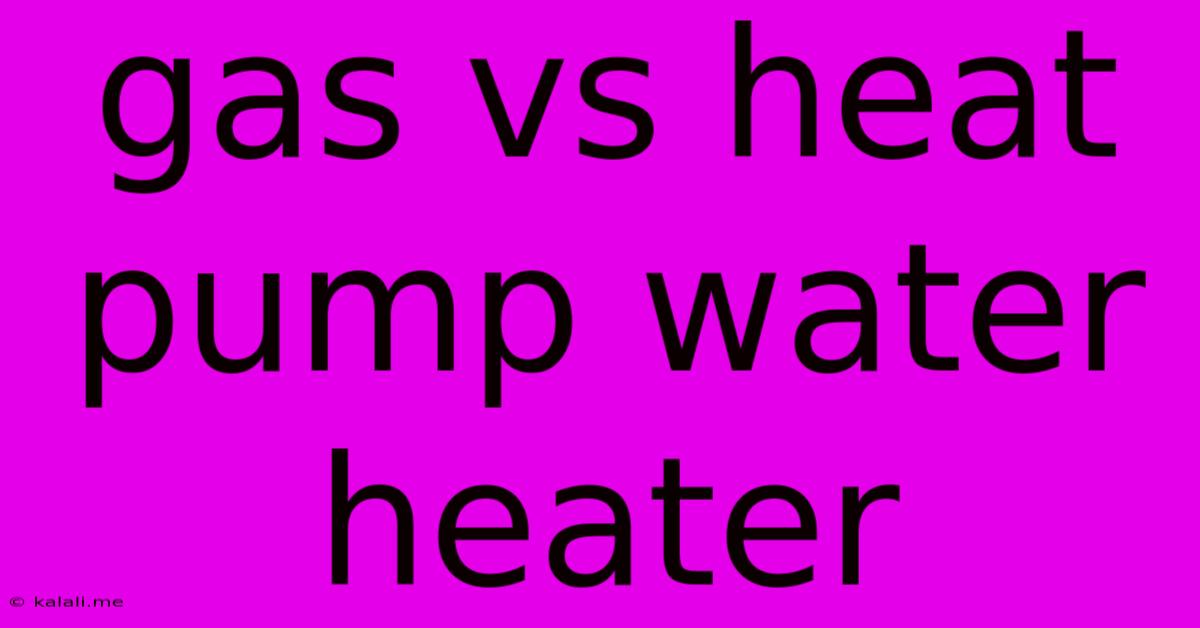Gas Vs Heat Pump Water Heater
Kalali
Jun 07, 2025 · 3 min read

Table of Contents
Gas vs. Heat Pump Water Heater: Which is Right for You?
Choosing the right water heater can significantly impact your energy bills and comfort. Two popular options vying for your attention are gas and heat pump water heaters. This comprehensive guide will delve into the pros and cons of each, helping you make an informed decision for your home. Understanding the differences in energy efficiency, upfront costs, and environmental impact will be key to selecting the best fit for your needs and budget.
Understanding the Technology: How Each Works
Gas Water Heaters: These traditional workhorses heat water by burning natural gas or propane. A burner heats a tank of water, maintaining a consistently hot supply. They are known for their reliable, instant hot water delivery.
Heat Pump Water Heaters: These energy-efficient champions use a refrigerant cycle similar to a refrigerator to extract heat from the surrounding air and transfer it to the water. They require significantly less energy to heat water than traditional gas models. While they may offer slightly slower hot water delivery, the energy savings often outweigh this minor inconvenience.
Key Differences: A Head-to-Head Comparison
| Feature | Gas Water Heater | Heat Pump Water Heater |
|---|---|---|
| Energy Source | Natural gas or propane | Electricity |
| Efficiency | Varies; generally less efficient than heat pumps | Very efficient; significantly lower energy use |
| Water Heating Speed | Fast, nearly instant hot water delivery | Slower; may require a larger tank for consistent hot water |
| Upfront Cost | Lower | Higher |
| Installation | Relatively straightforward | More complex; may require specialized venting |
| Maintenance | Minimal; occasional anode rod replacement | Slightly higher; regular cleaning of coils |
| Environmental Impact | Higher carbon footprint | Lower carbon footprint; reduces reliance on fossil fuels |
| Operating Noise | Relatively quiet | Can produce a low hum; generally not intrusive |
Gas Water Heater: Pros & Cons
Pros:
- Lower initial cost: Gas water heaters typically have a lower upfront purchase price.
- Fast hot water: Provides near-instantaneous hot water.
- Reliable performance: Generally known for their consistent and reliable operation.
- Less complex installation: Easier and less expensive to install compared to heat pump models.
Cons:
- Higher energy consumption: Less energy-efficient than heat pump water heaters, leading to higher utility bills.
- Dependence on fossil fuels: Contributes to a larger carbon footprint.
- Potential for gas leaks: Requires regular inspection to prevent potential hazards.
Heat Pump Water Heater: Pros & Cons
Pros:
- High energy efficiency: Significantly reduces energy consumption and lowers utility bills.
- Environmentally friendly: Lower carbon footprint compared to gas models.
- Potential for rebates and incentives: Many utility companies offer incentives for installing energy-efficient heat pump water heaters.
Cons:
- Higher initial cost: More expensive to purchase than traditional gas water heaters.
- Slower hot water recovery: Takes longer to heat water compared to gas heaters; a larger tank size may be needed.
- Performance in cold climates: Efficiency can decrease in extremely cold climates.
- More complex installation: May require specialized installation and venting.
Which One Should You Choose?
The best choice depends on individual circumstances. Consider these factors:
- Climate: Heat pump water heaters perform best in moderate climates. In extremely cold climates, their efficiency may decrease.
- Energy costs: If electricity is expensive in your area, a gas water heater might be more cost-effective in the long run, despite higher energy consumption.
- Budget: Consider both the upfront cost and long-term savings on energy bills.
- Environmental concerns: If you prioritize environmental sustainability, a heat pump water heater is the greener option.
- Available space: Heat pump water heaters tend to be larger than gas models.
Ultimately, weighing these factors will help determine whether a gas or heat pump water heater is the better investment for your home. Consulting with a qualified plumber or HVAC technician can provide personalized advice based on your specific needs and local conditions. They can assess your home's energy usage, climate, and other factors to recommend the most suitable option.
Latest Posts
Latest Posts
-
What To Use Instead Of Coconut Oil
Jun 07, 2025
-
Led Max Lights Of Per Segment
Jun 07, 2025
-
Could Not Reliably Determine The Servers Fully Qualified Domain Name
Jun 07, 2025
-
How Do I Drill A Hole In Concrete
Jun 07, 2025
-
Gfci Outlet Red Light Wont Reset
Jun 07, 2025
Related Post
Thank you for visiting our website which covers about Gas Vs Heat Pump Water Heater . We hope the information provided has been useful to you. Feel free to contact us if you have any questions or need further assistance. See you next time and don't miss to bookmark.